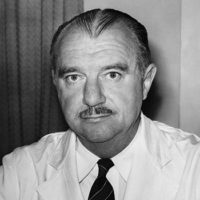
Vincent du Vigneaud
Cornell University Medical College
For studies of transmethylation as essential to animal nutrition, and for contributions to the structure and synthesis of biotin and penicillin.
Vincent du Vigneaud
Professor Vincent du Vigneaud has contributed richly to the science of biological chemistry. Out of his early interest in the structure and metabolism of sulfur compounds arose a new concept in regard to the essential role of methyl groups and amino acids in animal nutrition. These discoveries have been especially fruitful in regard to understanding the functions of the liver and kidneys, but they have no such limitation—they have provided many new windows through which the chemist, the biologist, and the physician can visualize changes that characterize all living cells.
In the field of vitamins, Dr. du Vigneaud’s accomplishments, in collaboration with his associates, have included extensive structural and functional studies of vitamin H, or biotin. Following the isolation of biotin, its detailed structure was established by their work and the assigned formula was confirmed by synthesis in independent laboratories.
During the war years, Dr. du Vigneaud worked intensively on the chemistry of the critically needed antibiotic, penicillin. This work culminated in the creation of a synthetic product and proof of its identity with natural penicillin.
Few men are privileged to make so many basic discoveries and to establish experimental findings so clearly. Dr. du Vigneaud’s achievements in biological chemistry have had, and will continue to have, an extraordinary influence upon scientific research in many laboratories throughout the world. In addition, a record of his contributions should include reference to his rare gift of friendship, his training of outstanding young biochemists, and his skill as a lecturer.
Dr. du Vigneaud’s discoveries are invaluable to medical understanding of the functions of the liver and kidneys and are of significance when it is realized that diseases of the liver and kidneys cause the death of 95,000 persons in a single year.
He helped prove the identity of biotin as more than a yeast growth factor but as a vitamin, helped isolate it, worked out its chemical structure, all since confirmed. Armed with this knowledge, scientists have been better equipped to continue their investigations into the mechanism of this powerful vitamin, and to bring about a clearer understanding of its effects on living things.
Dr. du Vigneaud’s achievements have had, and will continue to have, and extraordinary influence upon scientific research in many laboratories.
